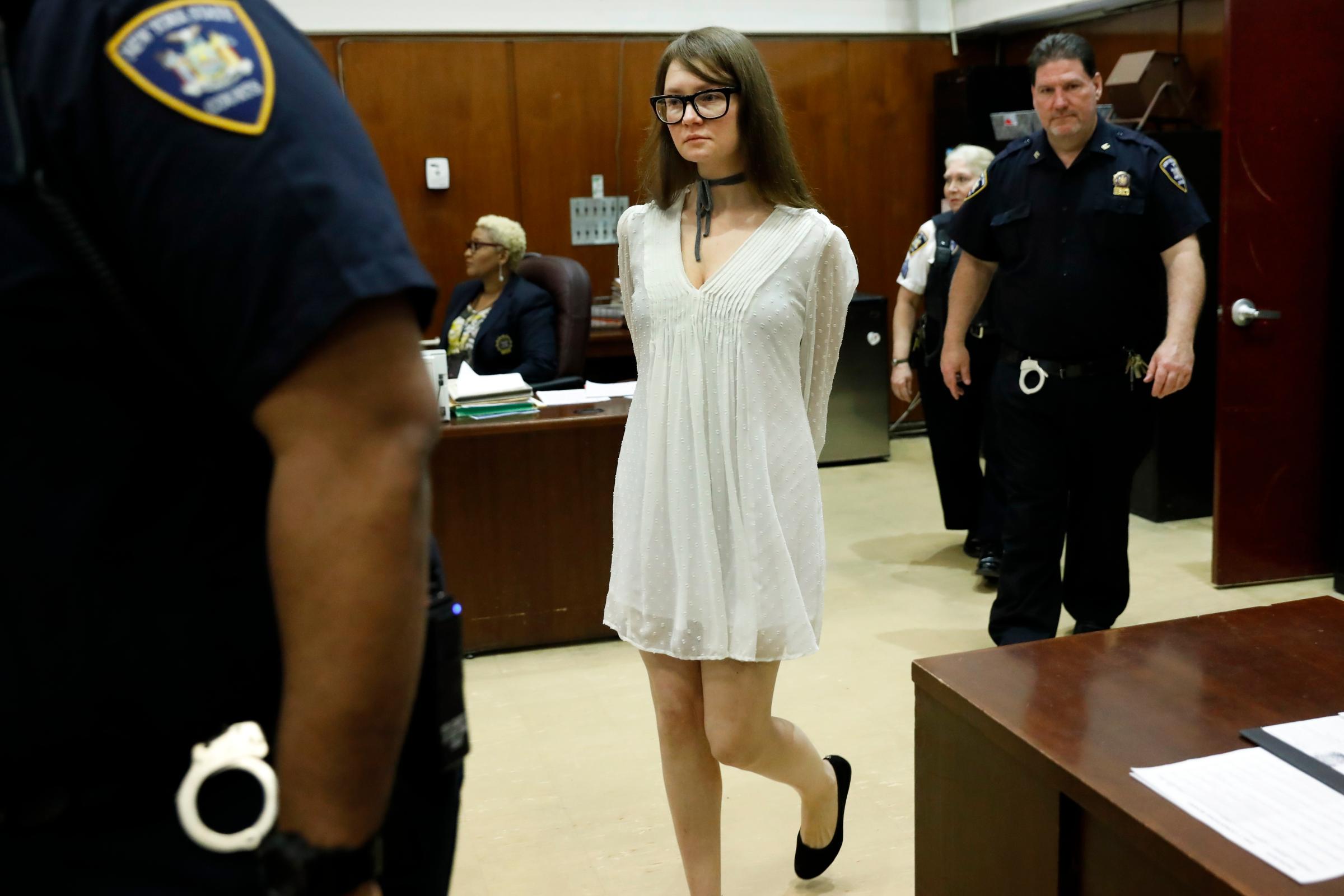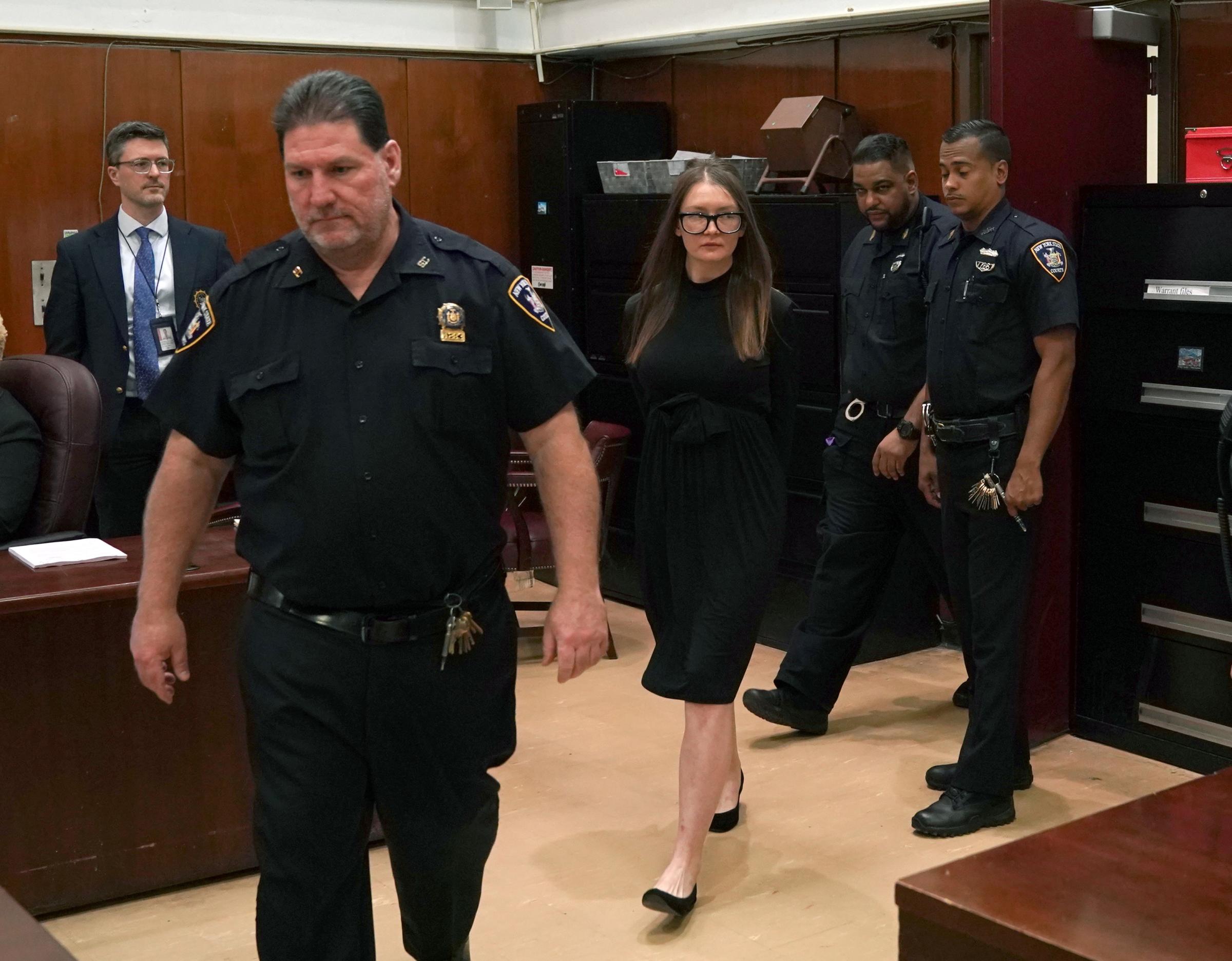A former New York City socialite received a prison sentence Thursday after swindling banks, luxury hotels and her friends out of hundreds of thousands of dollars by convincing them she was a German heiress with money to burn.
Anna Sorokin, 28, who was known among New York’s art and party crowd as Anna Delvey from 2013 to 2017, traveled all over the world and lived in expensive hotel rooms before she was arrested in October 2017 and jailed at Rikers Island. Sorokin’s case and extraordinary allegations of alleged grifting came to widespread attention following the publication of two prominent stories in New York Magazine and Vanity Fair in 2018. Both pieces highlighted the lengths to which Sorokin allegedly went to convince people, from close friends to banks and financial institutions, that she was a rich heiress with an endless well of money.
Prosecutors said Sorokin’s story was all made up. She was accused of grand larceny and theft of services for up to $275,000. In April, she was found guilty on many of the charges, including three counts of grand larceny and one count of attempted grand larceny. Sorokin was acquitted on one count of grand larceny and one count of attempted grand larceny — jurors found her not guilty of one of the most serious charges, attempted grand larceny in the first degree over a $22 million loan she allegedly attempted to secure. On Thursday, a judge sentenced Sorokin to four to 12 years in prison.
Sorokin’s trial and conviction came as other alleged grifters made headlines for penetrating elite circles in other parts of society — among them, Elizabeth Holmes and Fyre Festival’s Billy McFarland, both of whom were recently the subjects of documentaries. Sorokin’s story, too, will come to screens soon — Shonda Rhimes is currently developing an Anna Delvey Netflix series as part of her new deal with the streaming giant.
Jeffrey Chabrowe, a former prosecutor in New York City, told TIME as the trial began that the city “is somewhat obsessed” with Sorokin.
“She’s so brazen,” he said. “You don’t have a lot of 28-year-old female defendants who are attractive, who are able to successfully swindle a number of high-end financial institutions. She has unique appeal.”
Sorokin, who left behind a trail of confused and betrayed friends with her mirage of a rich life, fits right into the current cultural fascination with figures whose stories turn out way too good to be true. So, who is Anna Sorokin, really? Who was Anna Delvey? Here’s everything you need to know about the woman who claimed to be an heiress and her trial.
Who is Anna Delvey (but actually Anna Sorokin)?
The story of Anna Delvey exploded online after Vanity Fair published a story written by one of the fake heiress’s former friends who said Sorokin scammed her out of about $62,000. About a month later, New York Magazine published a story that tracked the so-called Anna Delvey’s life, from when she arrived in New York City to her eventual arrest.
Sorokin became a fixture of the New York social scene, making friends with people in the fashion and art worlds, as well as the rich trust-fund kids who populate certain circles of Manhattan. She spent money constantly, according to both accounts written about her life, on things like personal trainers, vacations and designer clothing, and frequently picked up the check for other people in her world. Sorokin’s backstory, as she told it, was murky—it was not clear to acquaintances whether she was really from Germany, as she claimed, or where her vast wealth came from. But she kept up the ruse through vague allusions to her background in Germany, and never being specific about where her supposed wealth came from, people who spoke with New York Magazine said.
The real Anna Sorokin was born in Russia in 1991 and moved to Germany in 2007 at the age of 16, New York reported. Her father was a truck driver who later on opened a heating-and-cooling business, he told the magazine. Sorokin did not have a trust fund, according to her father.
After dropping out of college, Sorokin interned in public relations before moving to Paris, where she became an intern at Purple magazine, New York reported. At this point, she began going as Anna Delvey, according to New York. Her parents supported her through that time period, they said.
Once in New York City, Sorokin “managed to be in all the sort of right places,” one acquaintance said. People she spent time with recalled certain strange behaviors they recounted to New York: paying for things in cash everywhere, “forgetting” to pay rent and borrowing large amounts of money without ever paying it back. At least one hotel allowed her to stay as a guest over a long period without putting down a credit card—she claimed she would pay the bill through a wire transfer, the New York report said.
For work, Sorokin’s main goal was to establish a private club, in the vein of something like Soho House. Her attempts to secure funding for her club, added to the money she allegedly scammed from hotels, led to Sorokin’s eventual downfall and arrest.
Sorokin has been held at Rikers Island without bail since October 2017. She rejected a plea deal and has pleaded not guilty to the charges.
What was Anna Sorokin accused of?
Sorokin was indicted in 2017 for stealing about $275,000 through “multiple scams between November 2016 and August 2017,” according to a press release from the Manhattan District Attorney’s office. She was found guilty on four counts of theft of services, three counts of grand larceny and one count of attempted grand larceny on Thursday.
The charges stemmed from numerous accusations toward Sorokin over her “variety of scams,” according to the DA. In 2016, prosecutors alleged, Sorokin claimed to be a German heiress in order to secure a $22 million loan to open the private club she wanted. To get the money, prosecutors said Sorokin provided falsified bank documents to multiple banks. Later, when the Fortress Investment Group agreed to consider loaning her the money if she could provide a $100,000 initial payment, the DA’s office said Sorokin borrowed the money from City National Bank by convincing a representative to let her overdraft her account. She promised to wire the money back, but that money never appeared, the DA said in the statement.
The investment group considering the loan for Sorokin had used about $45,000 of the $100,000 and was trying to verify her assets before completing the loan when she decided to withdraw from consideration. Sorokin kept the remaining $55,000 from the City National Bank loan and used it on personal items, the DA said in the statement.
Sorokin is also alleged to have invited a friend, Rachel Williams (who wrote the Vanity Fair article) on an all-expenses paid trip to Morocco, where Williams said she took care of all of the costs of the trip after Sorokin’s debit card was declined. Williams said she paid for about $62,000 worth of travel expenses, including the rental of a luxury villa. Sorokin never paid Williams back, the DA says.
A trail of bad checks and tens of thousands of dollars owed to various companies and hotels also come up in the DA’s indictment announcement, according to the press release.
Former prosecutor Jeffrey Chabrowe has said it is Sorokin’s behavior toward friends, such as leaving Williams with the bill in Morocco, that jurors likely focused on.
“If this girl was just taking from banks, not only would it be harder to have a conviction, I think there would be people literally cheering for her,” he says. “Like, good for her. When you’re doing it to you friend, and your friend thinks they’re being taking on a vacation of a lifetime and instead she loses a year of salary — I think that’s going to hurt [Sorokin] the most.”
What happened at Anna Sorokin’s monthlong trial?

Sorokin’s trial began at the end of March. Her lawyer, Todd Spodek, who did not immediately respond to additional requests for comment, told jurors in his opening statement that Sorokin did not intend to commit a crime, according to the Associated Press. Spodek said his client exploited a system “easily seduced by glamour and glitz” after seeing how appearing wealthy could open doors and land anyone in the center of the New York social scene.
Sorokin was simply biding her time until she could establish her business and repay her debt, Spodek argued. “Anna had to fake it until she could make it,” he said.
Spodek maintained a similar defense in his closing argument. He said Sorokin was “buying time” and had always intended to pay back her steep debts. She “was ambitious, she was persistent and she was determined to make her business a reality,” he said, attempting to paint Sorokin as a businesswoman struggling for her career.
“There’s a little bit of Anna in all of us,” Spodek said. “This is the life she chose to live.”
During the trial, a banker from City National Bank testified to say that Sorokin appeared to “speak the language” of the finance world when she was trying to secure a loan to build her private club. The banker said Sorokin convinced the bank to loan her $100,000 that she failed to repay.
Rachel Williams, who wrote about her experience traveling with Sorokin for Vanity Fair, testified in the trial about how her former friend allegedly scammed her out of tens of thousands of dollars of expenses. Williams was driven to tears while testifying on April 18. “This is the most traumatic thing I’ve ever been through,” she said, crying. “I wish I had never met Anna. If I could have gone back in time to not be where I am today, I would.”
Prosecutors said Sorokin spent tens of thousands of dollars to present as an heiress and afford the lifestyle she wanted. In a closing argument, Assistant District Attorney Catherine McCaw said Sorokin told “lie after lie” to keep up with a lavish lifestyle, according to the AP. She lived at luxury hotels without paying and hired a personal trainer for $300 per session, McCaw said. Sorokin would promise to send wire transfers for money she owed and then blame an “imaginary” accountant for the delay in sending the money.
“All of the defendant’s wire transfers are merely a figment of her imagination,” McCaw said. “These are not white lies. These are lies that help you understand that the defendant, in fact, had criminal intent in this case.”
Anna Sorokin’s courtroom fashion gains attention

Sorokin’s sartorial choices were closely observed throughout her trial after she appeared in a black designer shift dress and a black choker with framed glasses in her first court appearance. The source of the dress is up for debate — a New York Post report said the it came from Miu Miu, while an Instagram account dedicated to Sorokin’s court looks said it was by Michael Kors.
Anastasia Walker, a celebrity stylist, confirmed to TIME that she worked with Sorokin on her clothing choices for the first week of her trial. Walker did not respond to further requests for comment.

Spodek told GQ he hired Walker to make sure she looked appropriate at her trial.
“Anna’s style was a driving force in her business, and life, and it is a part of who she is,” he said. “I want the jury to see that side of her and enlisted a stylist to assist in selecting [sic] the appropriate outfits for trial. However the logistics of dropping off trial outfits at Rikers Island doest [sic] not work in our favor. Thanks.”
What happened at Anna Sorokin’s sentencing?

Judge Diane Kiesel sentenced Sorokin to four to 12 years in prison in state court on May 9.
At the sentencing, Kiesel said she was “stunned by the depth of the defendant’s deception,” the AP reports.
Speaking right before being sentenced, Sorokin said, “I apologize for the mistakes I made.”
What will happen next for Anna Sorokin?

Sorokin has been sentenced to between four and 12 years behind bars.
She also faces deportation to Germany. Authorities say Sorokin has overstayed her visa, and would have been deported regardless of the trial’s outcome, according to the AP. A U.S. Immigration Customs and Enforcement representative told Insider in March that Sorokin entered the U.S. on a Visa Waiver Program, which allows some people to enter the country without getting a visa beforehand to stay for a maximum of 90 days. Sorokin did not leave the country within that timeframe, ICE representative Rachel Yong Yow told Insider.
“ICE is requesting that we be notified prior to her release from local custody so she can be taken into ICE custody,” she said, according to Insider. “Regardless of whether or not she is convicted, she is amenable for removal because she is a visa waiver overstay. If she is convicted, she is sentenced to serve her time in the U.S.”
Sorokin’s story is likely to come up more in the coming years. On top of the the series about Sorokin planned by Shonda Rhimes for Netflix, Lena Dunham has signed on to produce a similar series based on the Vanity Fair article for HBO.
More Must-Reads from TIME
- Caitlin Clark Is TIME's 2024 Athlete of the Year
- Where Trump 2.0 Will Differ From 1.0
- Is Intermittent Fasting Good or Bad for You?
- The 100 Must-Read Books of 2024
- Column: If Optimism Feels Ridiculous Now, Try Hope
- The Future of Climate Action Is Trade Policy
- FX’s Say Nothing Is the Must-Watch Political Thriller of 2024
- Merle Bombardieri Is Helping People Make the Baby Decision
Write to Mahita Gajanan at mahita.gajanan@time.com